When it comes to multivitamins, one size doesn't necessarily fit all – and your age, sex, and dietary patterns all have a part to play.
Although diet should always come first, the UK National Diet & Nutrition Surveys consistently show that significant numbers of people do not get all the vitamins and minerals they need from their food.
Deficiencies are common for selenium (lack of which can lead to reduced immunity), iron (leading to anaemia), magnesium (which can cause fatigue and constipation) and calcium (affecting bone strength).1
Low vitamin D levels are especially concerning, with 17% of adults having low vitamin D status over the whole year, not just during the winter months.
As even a mild lack of certain micronutrients can lead to niggling symptoms such as lack of energy, poor immunity and general loss of wellbeing, it's a good idea to take a multivitamin supplement as a nutritional safety net.
However, it's important to choose the right one for you, taking into account your age, sex and dietary preferences.
Men
Look for: zinc and selenium
Supplements designed for men tend to include the key usual vitamins and minerals that are important for healthy joints and muscles, energy, immunity, and cognitive and psychological function, but there are two particular minerals men should look for: selenium and zinc.
Selenium is important for males to support normal sperm production. Zinc is also crucial for normal protein synthesis and testosterone levels, and plays a role in male fertility.
Some supplements also include an antioxidant blend to further support wellbeing.
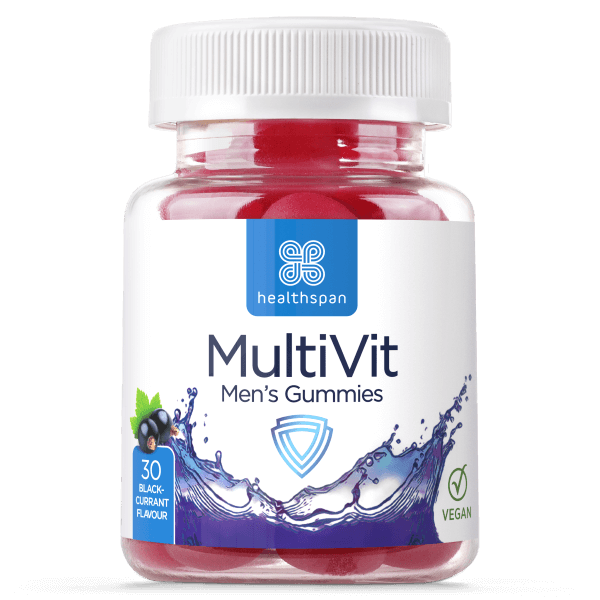
Men's MultiVit Gummies
Delicious blackcurrant multivitamin gummies formulated specially for men
- 12 vitamins and minerals including zinc and selenium to support joints and muscles, energy, immunity, psychological function and more
- Natural flavours with no added sugar
Women
Look for: iodine and biotin
As well as a full spectrum of vitamins and minerals – including vitamins A, B3, B6, B12, C, D3, E, K1, folic acid, and zinc to help with immunity, metabolism, bone health and energy levels – iodine is also important for women's health.
Iodine helps support hormonal balance, thyroid function and metabolism. For pregnant women, iodine intake is also vital to a baby's brain development.
Deficiency is more often seen in women; 10% of those between 19 and 64 years of age have iodine intakes that put them at high risk of deficiency.2
Biotin, the beauty B vitamin, is also often included in women's multivitamins to help support healthy-looking hair and skin.
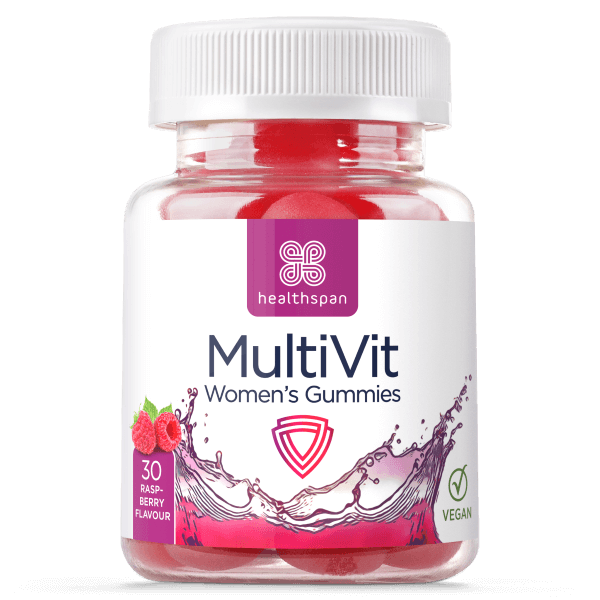
MultiVit Gummies
Delicious raspberry or blackcurrant gummies, suitable for vegans and specially formulated for women or men
- One-a-day multivitamin to support joints, muscle, energy, immunity and more
- Natural flavours with no added sugar
Over 50s
Look for: increased levels of vitamins and minerals
While diet should always come first, we tend to eat less with age, due to reduced appetite, cutting back to lose weight or choosing to avoid certain foods.
Yet, as we get older, our need for many vitamins and minerals increases and, at the same time, our ability to absorb nutrients decreases.
As a result, older people tend to develop more vitamin and mineral deficiencies that contribute to reduced immunity and higher levels of inflammation, which can affect immune function.
Research involving people aged 55 and over found that those who took a daily multivitamin and mineral supplement for 12 weeks had significantly better ability to fight off infections than those taking a placebo.3
Supplements aimed at those aged 50 and over tend to have boosted levels of important vitamins and minerals to ensure they don't miss out.
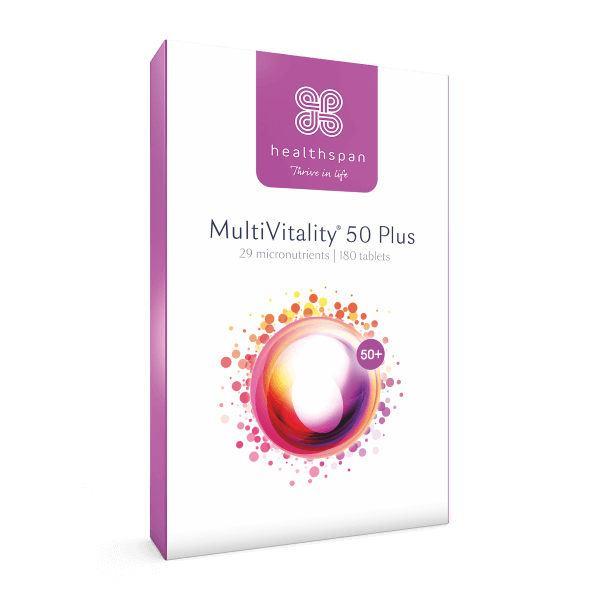
MultiVitality 50 Plus
Advanced multivitamin for the over-50s
- High levels of 13 vitamins and 12 minerals to help safeguard your immune health, brain, heart, nervous system, muscles, bones, teeth, and energy levels
- Comprehensive nutritional support for less than 6p a day
The absorption of many nutrients depends on the presence of good levels of stomach acidity, especially when it comes to dissolving mineral salts and releasing electrolytes such as calcium, iron, magnesium, zinc and phosphate so they can be absorbed.
Unfortunately, your stomach lining becomes less active with age, so the production of stomach acid is reduced and may even stop altogether due to inflammation of the stomach lining. This is surprisingly common, with atrophic gastritis affecting almost a third of people aged 60 or more.4
This reduces absorption of micronutrients such as folic acid, vitamin B12, carotenoids, iron, zinc and calcium, and studies have found that an astonishing 60% of people over the age of 75 are deficient in vitamin B12.5
It therefore makes sense to select a supplement specially designed for your age group.
Over 70s
Look for: coenzyme Q10 and vitamin B12
Multivitamins designed for older age groups such as 70+ have increased levels of most micronutrients, with the exception of iron which you typically need less of in later life – especially women who no longer menstruate.
A 70+ formula will often include other beneficial ingredients such as coenzyme Q10, too.
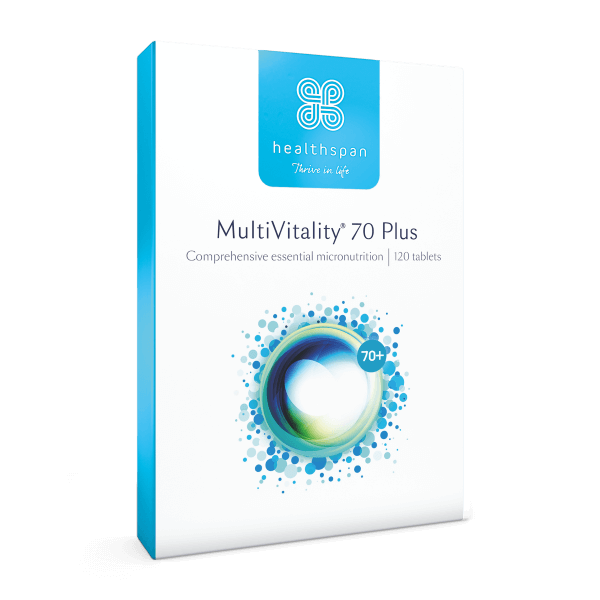
MultiVitality 70 Plus
Comprehensive multivitamin for those over 70
- B vitamins, iron and zinc contribute to cognitive health
- High levels of vitamin D3, vitamin K, magnesium and calcium help maintain normal bones
- Co-enzyme Q10 and vitamin B1 for normal heart function
Vegetarians and vegans
Look for: vitamin B12, iron and vitamin D
People who follow a plant-based diet can sometimes have difficulty obtaining certain micronutrients such as iron, vitamin B12, vitamin D3 and zinc.
Many therefore choose to take a multivitamin supplement developed from plant-sources, including marine algae.
Children
In general, children have different vitamin and mineral needs, depending on their age and their size and weight. Having said that, many adult supplements can be taken from age 12 years, and some men's and women's gummies are suitable for ages 5 years upwards, so check manufacturers' recommendations.
Gummies can be a good option to make taking their vitamins a treat rather than a chore, particularly for vitamins C and D during the winter months.
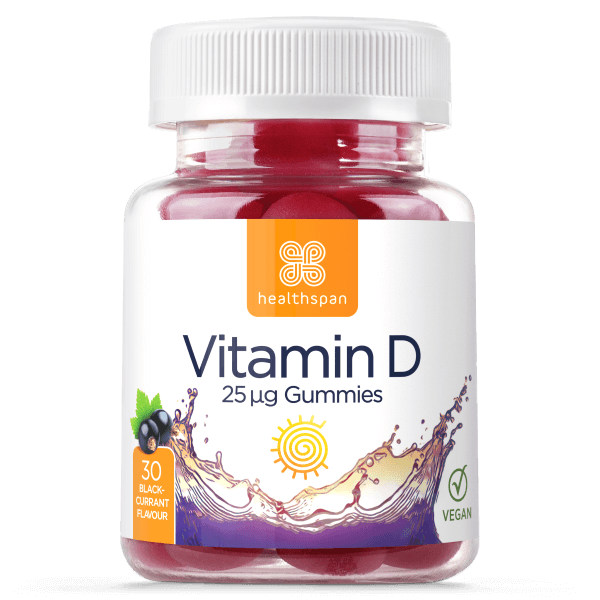
Vitamin D Gummies
Super-strength vitamin D in a delicious blackcurrant gummy
- 25mcg vegan vitamin D3 in each gummy
- Supports immunity, bones and muscles
- Natural blackcurrant flavour, no added sugar






